The 41st Wicked Queer Boston Film Festival is currently underway boasting over 120 LGBTQ-themed films from around the world–shorts, features and docs included.
The Opening Night selection was Allan Deberton’s The Best Friend and Todd Verow & Charles Lum’s Memoriabilia, while the Fest closes with Elena Oxman’s Outerlands.
Films will screen at the Brattle Theatre, Coolidge Corner Theater, Museum of Fine Arts, ICA, Mass Art, BFSR Emerson, and Boston University.
Tickets and the full schedule are available at wickedqueer.org
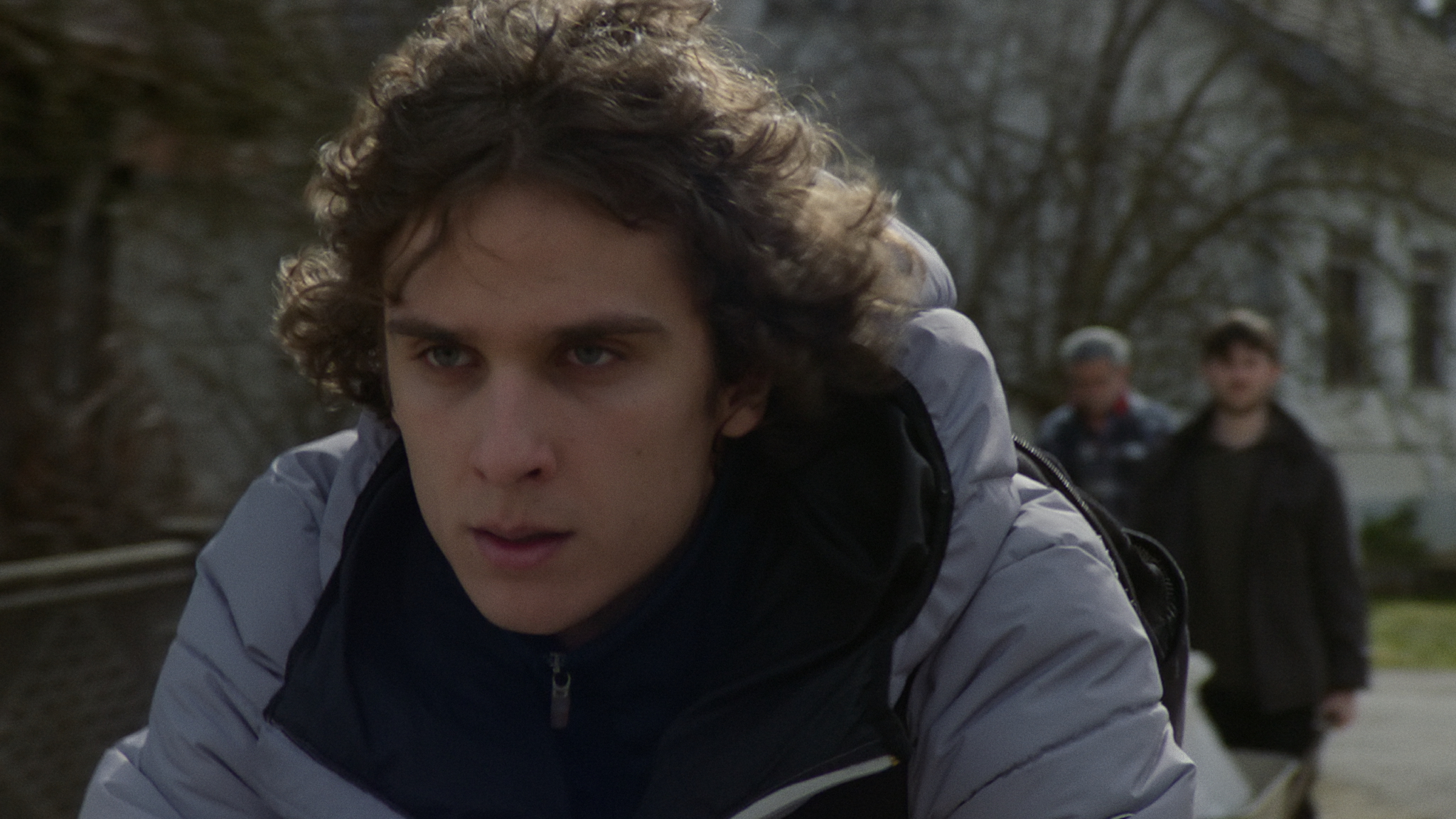
I was able to sample a number of the offerings and highly recommend a few. First and foremost, Cejen Cernek Canak’s stirring Sandbag Dam (Croatia/Lithuania/Slovenia) which I reviewed via the Berlinale earlier in the year.
Here are handful of other films to watch out for:
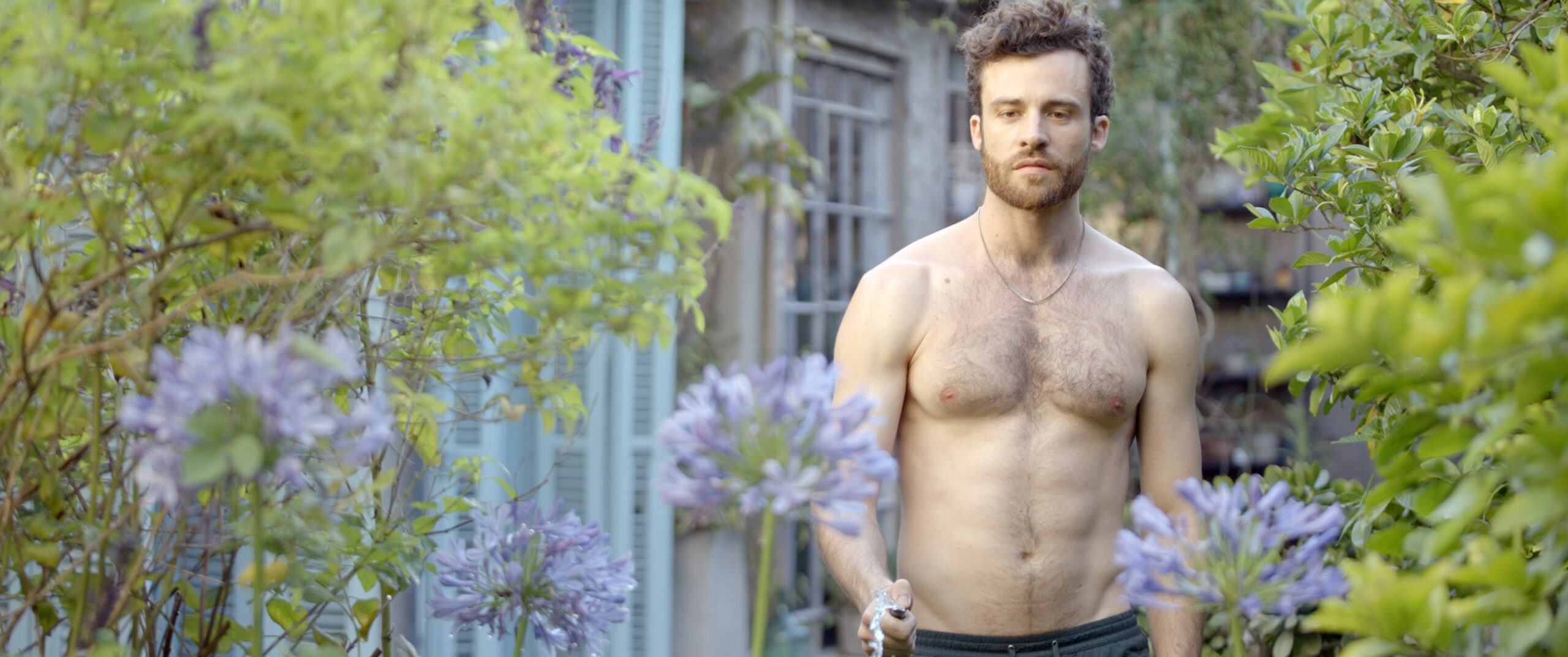
300 Letters
Jero (Cristian Mariani) is a fit young man who, despite never wanting to commit to anything beyond hook-ups, has fallen in love with Tom (Gastón Frías), a snobbish poet-wannabe. They’ve taken social media by storm as the ideal gay couple. But on their one-year anniversary, Jero returns home to discover Tom has left him—with a box of 300 letters, written each day they spent time with each other. Tom claims these letters will illuminate why he’s left and the fact that their love story was not what Jero thought it was.
I was initially put off by the seeming gimmick inherent in 300 Letters that the viewer needed to capitulate to, but I hoped it would all make sense in the end—and it did. Argentinian helmer Lucas Santa Ana has crafted what appears to be a one-sided gay love story but, instead, turns out to be a harsh, cutting commentary on certain judgmental, elite gays. Taken as microcosm, the film is also a truly incisive meditation on today’s divisive world.
And, most admirable, Santa Ana never compromises his movie by forcing a certain character to reflect on his hate and superficiality in order to achieve a type of redemption. Instead, the audience is left to ponder where they fit into this current black-and-white world populated with people who despise and denounce one another without ever getting to know one another.
Nitpicking a bit, the script could have used tweaks, and I wish some of the wonderful supporting actors had more juicy roles, specifically Bruno Giganti as Jero’s bestie Esteban and hottie Jordán Romero as Pablo.
300 Letters is one of the more significant queer-themed films on the recent festival circuit and should be required viewing for anyone so immersed in their bubble world they find themselves feeling superior to others.
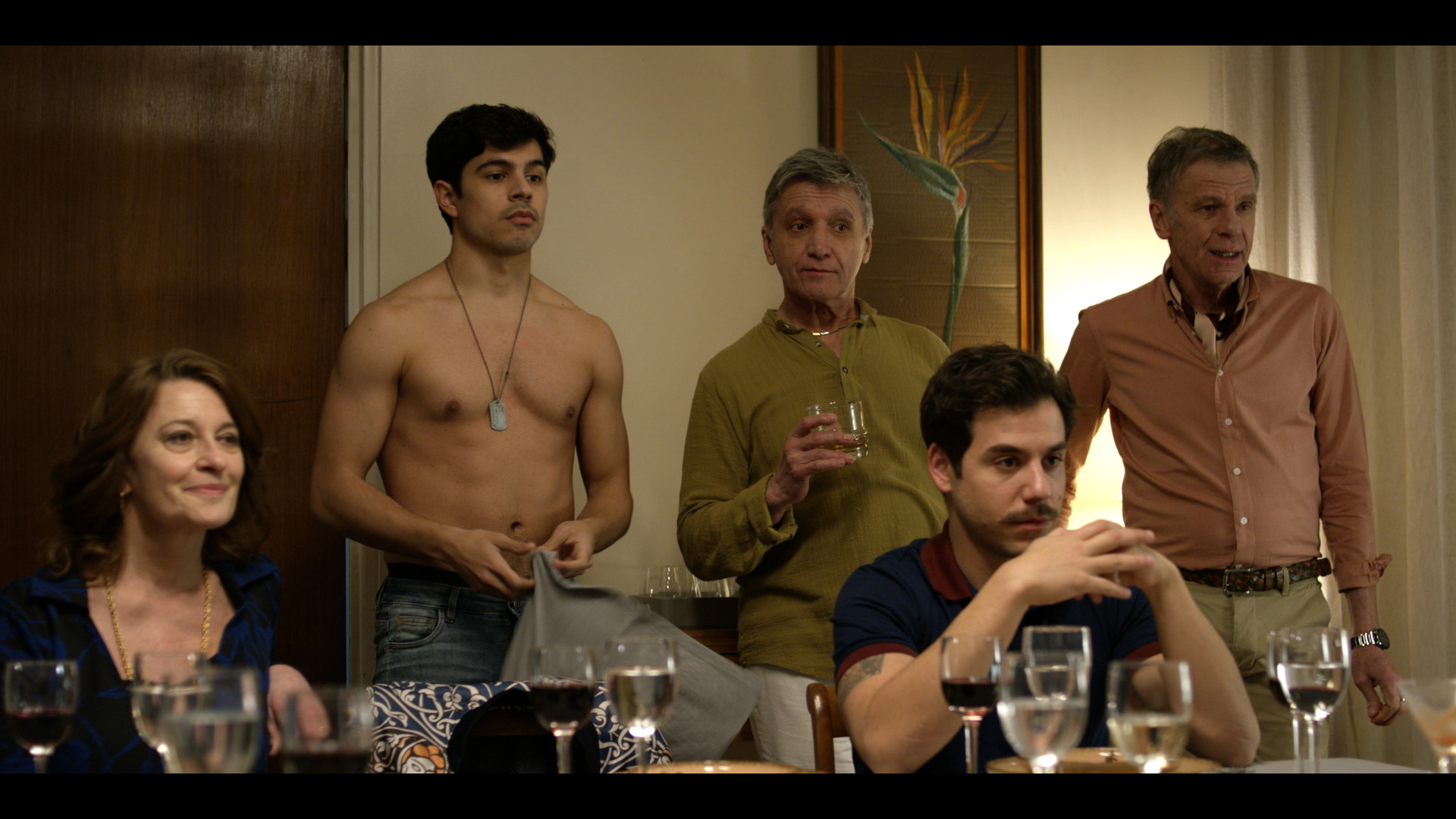
Blue Lights
The quite prolific Lucas Santa Ana has a second feature at this year’s festival, Blue Lights, another impressive, emotionally-spirited work that promises sparks and revelations galore but surprises by presenting a sweet and loving portrait of a group of fragile friends, in Buenos Aires, simply trying to make their way in this complicated and demanding world.
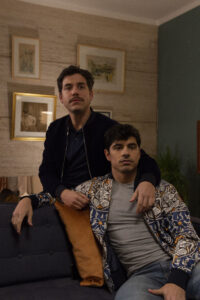
Alejandro (Ernesto Larrese) is about to turn 70. He’s lived with his partner Pedro (the late Claudio Da Passano) for over 3 decades. Their young friend, Fabián (Fernando Dente) has brought his randy boyfriend Miguel (Nicolás Di Pace) to the festivities. And it turns out Miguel recently had a hook up encounter with another guest, Pablo (Hernán Morán) a middle-aged bear who is coupled with Edgardo (Javier Rodríguez Cano). Four other guests are also on hand, include two lesbians and a straight couple, all with their own issues in tow.
Rounding out the mostly upper-middle-class attendees, an old friend, Germán (Osmar Núñez) arrives late with some distressing news about his health.
Santa Ana is deft at authentic dialogue and engaging conflicts. Here he captures the differing generational approaches to socially aware issues, and he explores how love and desire change as you get older. He also examines the ever-evolving complexities in queer life. One character offers, “everything changes in the blink of an asshole in the world of gays.”
The ensemble is uniformly wonderful with Di Pace, in particular bringing depth to a character who could have easily been played as superficial and egocentric.
In the end the strong bonds outweigh the squabbles and disagreements, although, for some, a life-change is vital for mental health and personal growth.

The Wedding Banquet
Oscar-winner Youn Yuh-Jung (Minari) delivers such a lovely, nuanced performance in Andrew Ahn’s reimagining of Ang Lee’s 1993 Oscar-nominated breakthrough film, The Wedding Banquet, that no matter it’s faults, the film is more than worth seeing to watch the truly magical transformation of her character. And the amazing Joan Chen (The Last Emperor) is equally good as a self-centered parent who learns to, at least, admit her faults. One hopes the talented young cast members took note of the two gifted actors they were working with.
Set in Seattle, the basic plot sees young, rich and cute Min (impressive newcomer Ha Gi-Chan) proposing to his beau of five years, the commitment-phobic Chris (the ubiquitous Bowen Yang), who turns him down. So to get his green card and help his friends afford to IVF a child, Min proposes to their lesbian friend Angela (Kelly Marie Tran) instead. Angela is in a relationship with Lee (Lily Gladstone, in too small a role). Things start to go off the rails when Min’s Korean grandmother (Youn) decides to fly in for the wedding. But grandma isn’t as naive as they think she is.
Ahn and Lee’s original co-screenwriter James Schamus adapted this version giving it a modern, queerer spin where they get to pay homage to the first film while exploring certain current realities. And for most of the film, the formula works. The film tends to dip too melodramatic about 3/4 of the way through and then goes on to a rather forced ending. But until then, it’s a treat.
The Wedding Banquet will be released nationwide April 18, 2025.
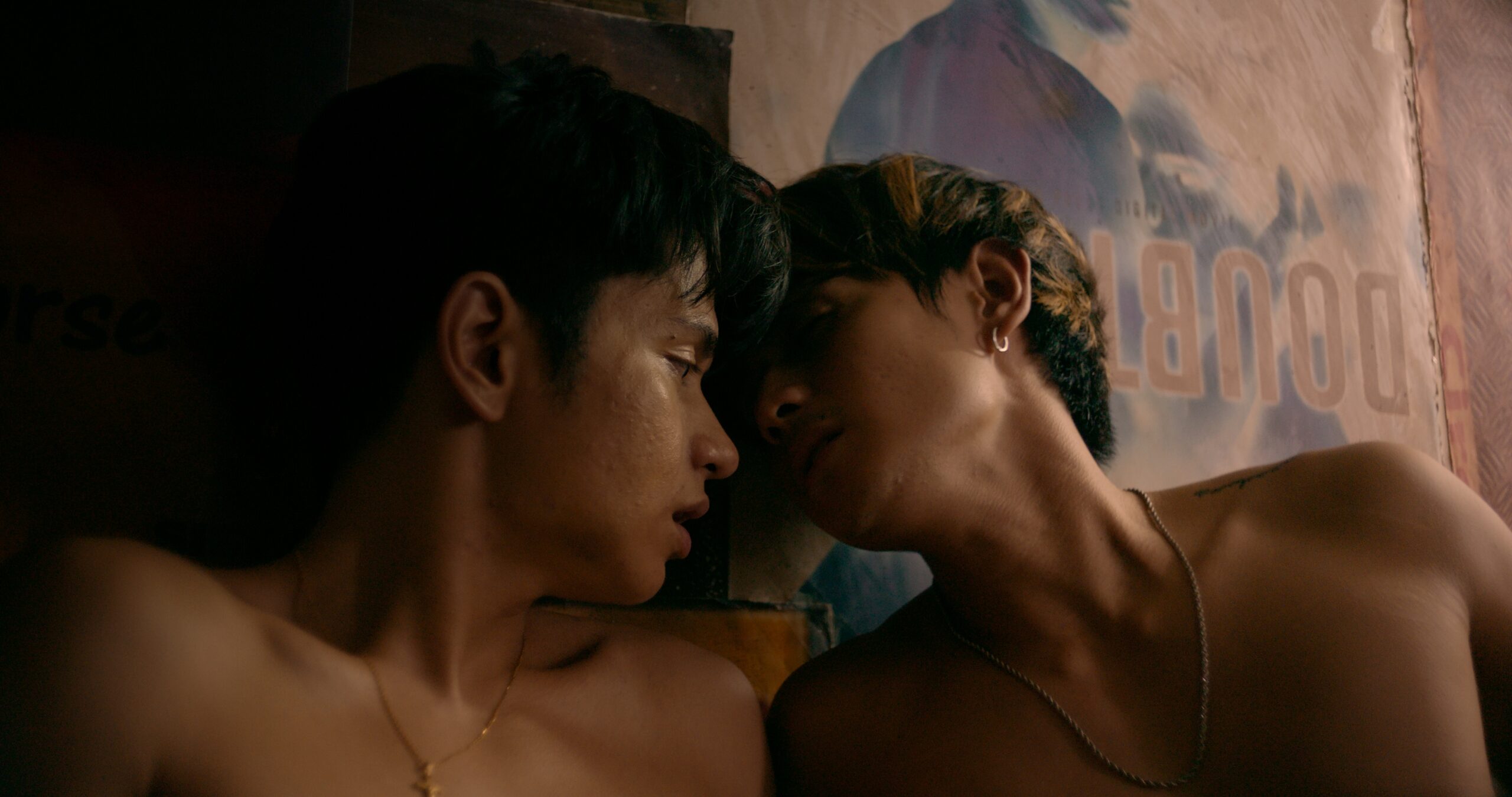
Some Nights I Feel Like Walking
Filipino filmmaker Petersen Vargas’s funky, evocative new feature Some Nights I Feel Like Walking mesmerizes from start to finish, even when the narrative is a bit confusing and meandering. The film has a dream-like (sometimes nightmarish) quality blended with gritty realism telling a tale of a gaggle of male prostitutes who must deal with the tragic loss of a friend. It’s queer Greek tragedy meets gay-themed Dickens.
Street-wise Uno (an excellent Jomari Angeles) meets jittery and troubled Zion (a riveting Miguel Odron), and sparks fly, but both seem apprehensive about taking things a step further. Two years later they meet again as hustlers. The early scenes in the film create the sex worker Manila milieu of wait rooms, rest areas and porn theaters where these boys make their living. Uno leads his group of boys who aren’t very welcoming to outsider Zion. But when one of them OD’s, the gang must decide what to do with the body.
Vargas isn’t as concerned with plot or a cohesive narrative as he is with delving into the life of struggle these boys are born into. The main issue I had with the film is that it felt too safe, not just in its expose’ on the have and have-nots, but in its queer storytelling, which coulda-shoulda gone a lot further.
Still, the moody atmosphere as well as the solid performance make it worthwhile. Gold Aceron, Argel Saycon and a standout Tommy Alejandrino, round out the impressive ensemble.
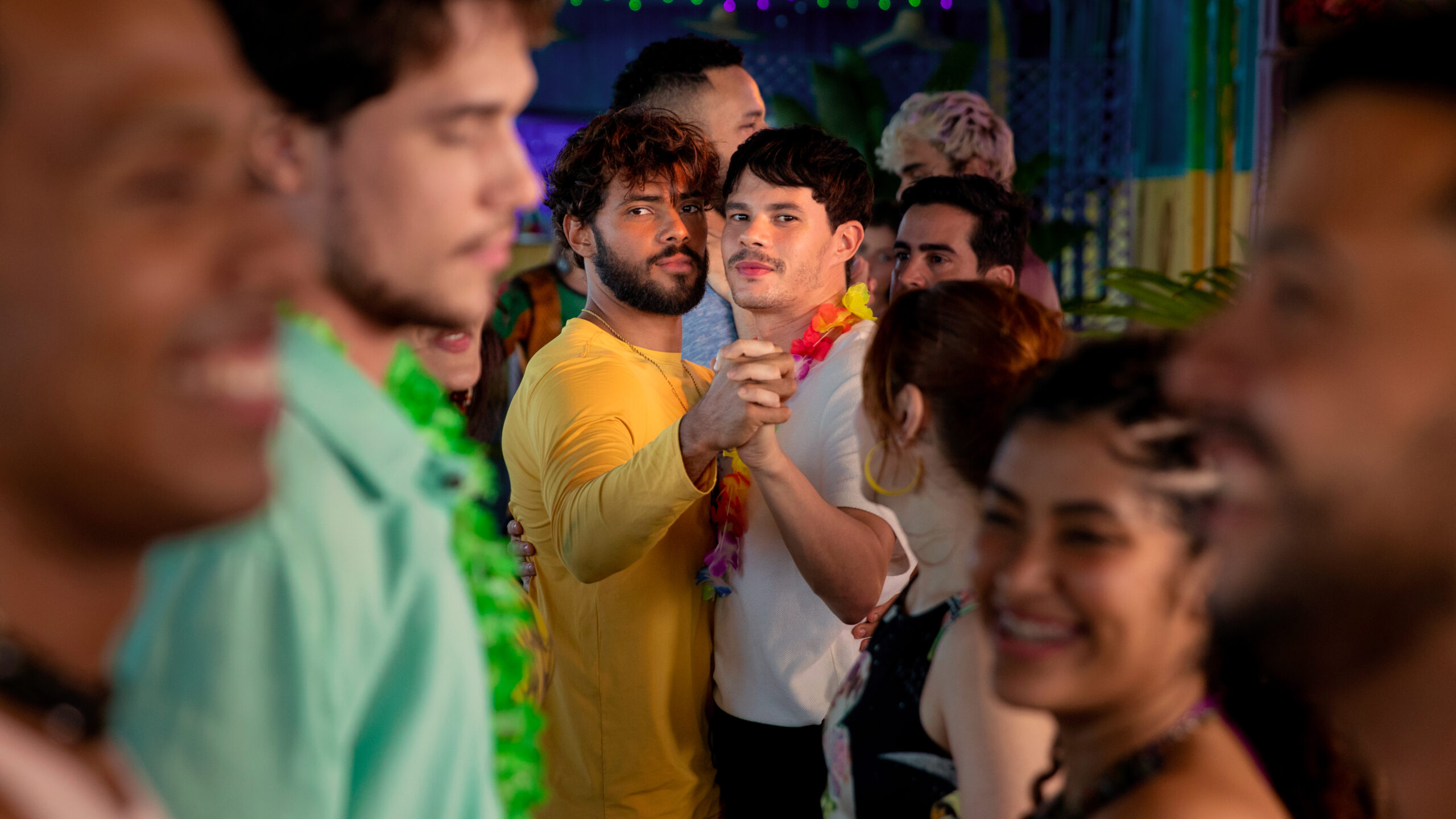
The Best Friend (O Melhor Amigo)
Allan Deberton’s strange, unpredictable and visually stunning Portuguese musical, The Best Friend, is about two amigos, Lucas (Vinicius Teixeira) and Felipe (Gabriel Fuentes), who reunite after years of estrangement. Lucas is a very tentative, shy type who was once overweight and apparently hit on Felipe when they were younger, only to have his advances thwarted. Now many moons and a lot of weight loss later, Lucas visits the gorgeous and sculpted Felipe in Canoa Quebrada. Felipe is now a sex worker, and strong feelings begin to once again manifest.
This film began life as a 2013 short and is very slim on plot. The musical numbers are often drag performances, but sometimes the characters will just break into song. It’s certainly a unique and curious movie. And Fuentes has a smoldering quality that will make gay men want to swoon (count me among them) so that is more than enough to keep gay audiences enthralled.
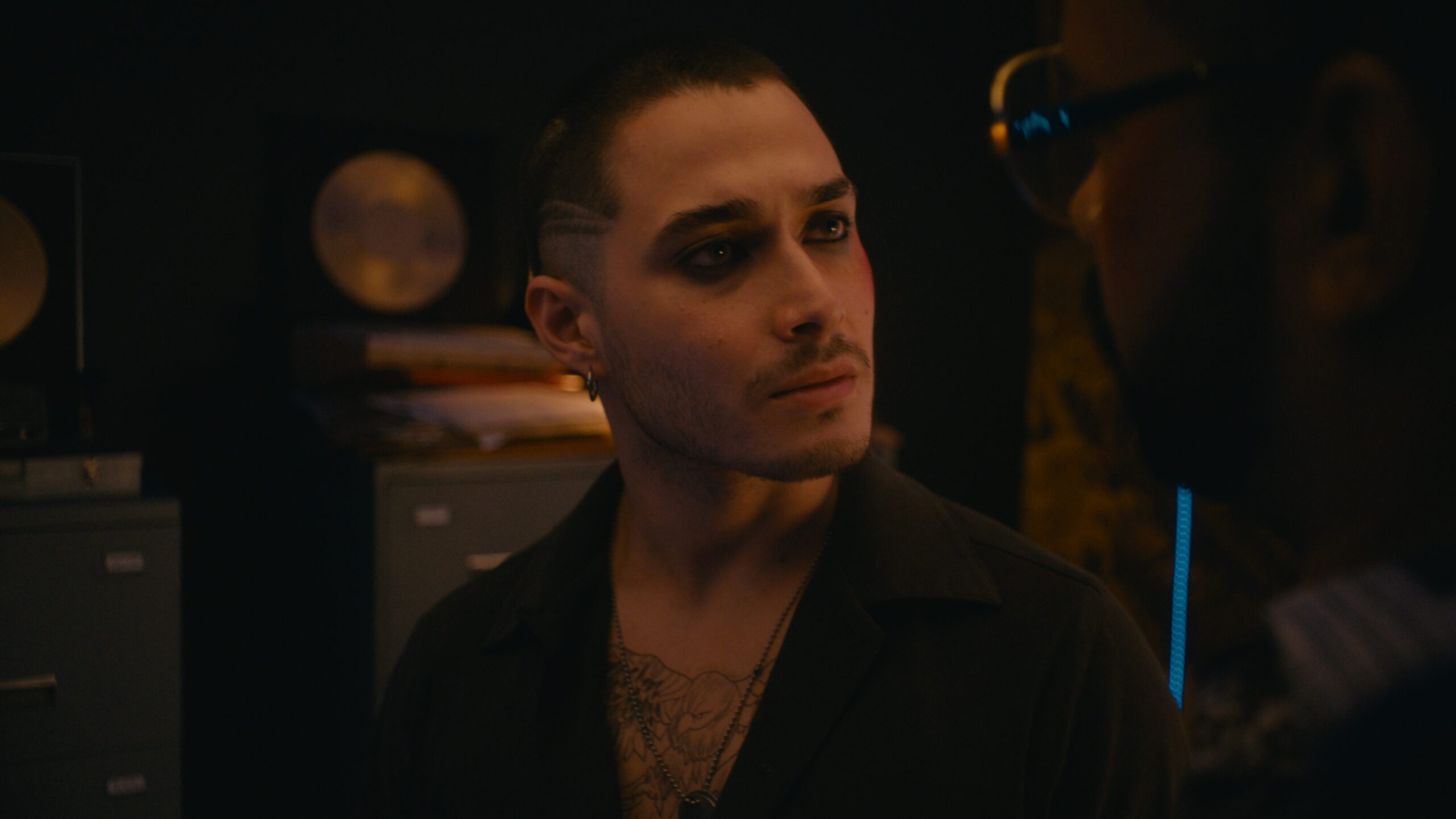
Rains Over Babel
Spanish-Colombian filmmaker Gala del Sol has fashioned a bizarre but dazzling queer-positive debut feature, Rains Over Babel, which is mostly set in a dive bar that doubles for the kind of purgatory where drag queens thrive, a demonic figure, La Flaca, toys with people’s lives and a yummy Grim Reaper (handsome Felipe Aguilar Rodriguez) is on the prowl! Oh, and club owner, El Boticario (Santiago Pineda), may actually also be Satan. The pic is a hypnotic, fantastical, punk visual feast where death is forever looming. del Sol is a filmmaker to watch.









